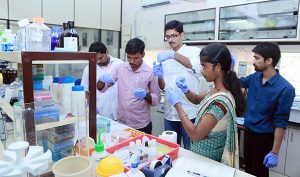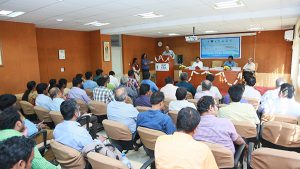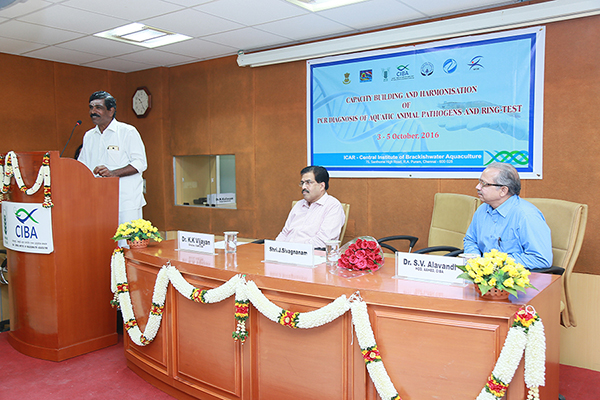The first phase of capacity building and harmonisation of PCR diagnosis of aquatic animal diseases, the National training programme on “Molecular diagnosis of shrimp diseases” was held during 3rd – 5th October 2016 at ICAR-Central Institute of Brackishwater Aquaculture (ICAR-CIBA), Chennai. The programme with hands on training was organised in collaboration with the Coastal Aquaculture Authority (CAA), Marine Products Development Authority (MPEDA) and Rajiv Gandhi Centre for Aquaculture (RGCA), supported by National Fisheries Development Board (NFDB), Hyderabad. The present first phase would be followed by a two stage follow up programme, in two phases, evaluation of the participating polymerase chain reaction (PCR) laboratories and PCR ring test. Twenty two representatives from private and Government laboratories of Andhra Pradesh, Tamil Nadu, Karnataka, Maharashtra and Gujarat from brackishwater aquaculture sector had participated in this national level training programme.
The programme was inaugurated on 3rd October, while welcoming Dr.S.V. Alavandi, Principal Scientists & Head of the Aquatic Animal Health and Environment Division, outlined the process of PCR ring test and suggested to the laboratories and participants for improving the performance and enhancing the skill levels of PCR laboratory. Finally, the diagnostic laboratories which qualify the required quality conditions would be certified. This exercise would pave the way forward for the upkeep of the shrimp seed quality in the country contributing towards sustainable shrimp farming.
Inaugurating the training programme, the Chief Guest, Mr.J.Sivagnanam, a progressive aqua farmer, highlighted the role to be played by the PCR testing laboratories for the sustainability of aquaculture operations in view of disease outbreaks due to white spot disease (WSD) and the new threat of Enterocytozoon hepatopenaei (EHP). He stressed the harmonisation of PCR tests among the laboratories is of paramount importance to restore the confidence of farmers and overall well-being of the shrimp farming sector.
The valedictory function was chaired by the chief guest Dr.Baskaran Manimaran, Former Vice-Chancellor, Tamil Nadu Fisheries University. He expressed his views that it was a unique of its kind to have national level training on PCR harmonisation and need of an hour for the betterment of the shrimp sector. He stressed upon every shrimp hatchery in India to have ICAR-CIBA, MPEDA and CAA certified PCR labs to have a premium price for their quality seeds supplied to the farmers.
Dr.R.Jayaraman, Director, CAA expressed that the expression of interest from the shrimp industry was not encouraging and requested responsible shrimp farmers and hatchery owners to participate in ring test to bridge the interaction between research organisations and industry.
Dr.K.K.Vijayan, Director, ICAR-CIBA during his presidential address mentioned that the brackishwater aquaculture in India has been witnessing phenomenal growth during the past six years with productions crossing 3,50,000 metric tonnes of farmed shrimp and seafood export revenues touching over USD 5 billion during the year 2014-15. However, frequent disease outbreaks in aquaculture due to devastating diseases such as WSD and newly emerging pathogen such as EHP has been significantly affecting productions and economic viability of aquaculture enterprise. He stressed that healthy and disease free shrimp seed is one of the important biosecurity measures for sustainable shrimp farming. He further emphasised that the early pathogen detection is crucial for preventing viral disease problems in shrimp aquaculture. ICAR-CIBA is being a National Referral Laboratory for brackishwater aquatic animal diseases and has been serving the sector for over two decades. The participants in their feed back appreciated the initiative lead by CIBA in organising a very useful and valuable programme, and requested increased interaction between the govt. institutions and private industry. The programme was ended with vote of thanks by Dr.S.K.Otta, senior scientist followed by national anthem.


